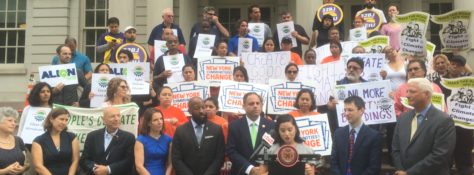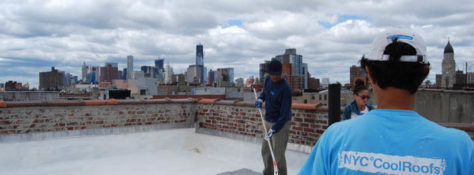News
Governor Cuomo and DEC announced that the settlement funds will be invested in clean transportation including earmarking 40% for buses - a successful step forward in our Clean Buses for Healthy Niños advocacy campaign. DEC will prioritize these emissions reduction projects in environmental justice communities that have traditionally been overburdened by pollution, which leads to higher rates of asthma and other respiratory illnesses.
Learn MoreNews
New York State Attorney General Barbara Underwood is taking steps to preserve the Obama-era Clean Power Plan, which would have reduced greenhouse gas emissions by nearly 30% nationwide.
Learn MoreNews
A recent study by Data Driven Yale shows that sub-national efforts have the potential to reduce global greenhouse gas emissions and represent a significant step forward in meeting the global temperature goals of the Paris Agreement. However, they are still not enough to prevent the dangerous warming that will trigger increased heat waves, mightier storms, rising seas and displacement of people.
Learn MoreNews
A coalition of over 40 environmental, governmental, housing, labor, and real estate groups recently unveiled the Blueprint For Efficiency plan to mandate dramatic energy use cuts in New York City’s large buildings. In conjunction with the plans release, City Council Member Costa Constantinides announced plans to introduce legislation this fall that would reflect much of the plan’s recommendations. The plan and accompanying legislation come after two years of discussions and negotiations between the city administration, City Council, and stakeholder groups on how to address the biggest contributor to the city’s greenhouse gas emissions - buildings.
Learn MoreNews
It is crucial for policymakers to pass legislation to divert food waste from landfills, as only 3% of waste produced in the state does not end up at either a landfill or waste-to-energy facility. The Food Recovery and Recycling Act (that, unfortunately, did not pass) would have discouraged the production, distribution, and preparation of excess food; recovered excess food to be redistributed to those in need; and provided funding for new recycling programs specifically concerning food scraps.
Learn MoreNews
If you have been keeping up with the news lately, you are bound to have heard that this year is projected to be one of the hottest on record … again. New York suffers from increased temperatures compared to its suburbs and exurbs due to a phenomenon called the urban heat island effect.
Learn MoreNews
The Trump administration’s plan to rescue coal power plants would be a disaster for the US energy market - and would cost taxpayers as much as $65 billion.
Learn MoreNews
New Yorkers are probably familiar with our natural lands and waters including parks, rivers, and bays. But we also have the responsibility to conserve natural resources across the nation and globe. To learn about tropical natural resources, NYLCV intern Riley Lenane attended a hands-on intensive ecological learning program.
Learn More



